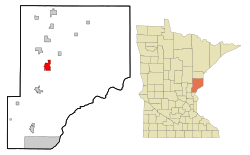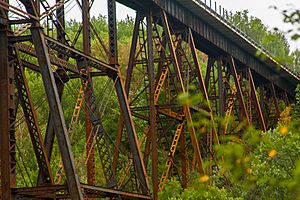Sandstone, Minnesota facts for kids
Quick facts for kids
Sandstone
Asiniikaaning
|
||
|---|---|---|
|
||

Location of Sandstone within Pine County, Minnesota
|
||
| Country | United States | |
| State | Minnesota | |
| County | Pine | |
| Incorporated (village) | September 28, 1887 | |
| Incorporated (city) | April 14, 1920 | |
| Area | ||
| • Total | 5.42 sq mi (14.04 km2) | |
| • Land | 5.26 sq mi (13.61 km2) | |
| • Water | 0.17 sq mi (0.43 km2) | |
| Elevation | 1,076 ft (328 m) | |
| Population
(2020)
|
||
| • Total | 2,462 | |
| • Density | 468.42/sq mi (180.84/km2) | |
| • Demonym | Sandstonian | |
| Time zone | UTC-6 (Central (CST)) | |
| • Summer (DST) | UTC-5 (CDT) | |
| ZIP code |
55072
|
|
| Area code(s) | 320 | |
| FIPS code | 27-58396 | |
| GNIS feature ID | 2396533 | |
Sandstone is a city in Pine County, Minnesota, United States. It is located along the Kettle River. In 2020, about 2,462 people lived there.
Major roads like Interstate 35 and Minnesota State Highways 18 and 23 pass through Sandstone. The beautiful Banning State Park is also very close by.
Contents
History of Sandstone
The area where Sandstone is now was first settled in 1857. A village called Fortuna was started by Caleb C. Ward. It was located where the Point Douglas to Superior Military Road met the Kettle River. Fortuna even served as the main town for Buchanan County, Minnesota. By 1887, about 200 people lived there.
Just north of Fortuna, another village called Sandstone was started in June 1887. It officially became a village on September 28, 1887. Later, on April 14, 1920, Fortuna and Sandstone joined together. They became one larger place, known as the City of Sandstone.
The city's name comes from the Ojibwe language. In Ojibwe, it is called Asiniikaaning. This means "at the quarrying place." This name makes sense because there is a large sandstone quarry right at the edge of the city.
Geography and Natural Features
Sandstone covers an area of about 5.43 square miles (14.04 square kilometers). Most of this area, about 5.26 square miles (13.61 square kilometers), is land. The rest, about 0.17 square miles (0.43 square kilometers), is water.
The city is famous for being on the Kettle River. This river is known for its unique "glacial kettles," which are holes in the rock formed by glaciers. It also has exciting rapids that are very popular with people who enjoy kayaking and canoeing.
The town grew up around a big sandstone quarry. A famous railroad builder named James J. Hill used this local sandstone to construct many buildings in the town.
Fun Things to Do in Sandstone
Sandstone has many cool places and activities for visitors and residents.
Robinson Park: Adventure and History
One special place is Robinson Park. It's a historic and natural area perfect for picnics. It's also a popular spot for outdoor sports. People enjoy sport-climbing and bouldering on the rock formations. In winter, it becomes a great place for ice climbing. The park also helps preserve the history of the Sandstone Quarry. Plus, it's an easy place to get to the Kettle River for water activities.
Festivals and Events
Sandstone hosts exciting festivals throughout the year.
- The Sandstone Ice Festival happens every December. It's a way to celebrate winter. People can try ice climbing, winter camping, and snowshoeing.
- In the spring, local paddlers organize the Kettle River Paddle Festival. This event is for canoeists and kayakers. It includes a downriver race and a whitewater rodeo. Paddlers from all over the Midwest come to join the fun.
Nature and Education
Sandstone is surrounded by Banning State Park, offering lots of outdoor adventures. The city also connects to the Munger Bicycle Trail, which is great for biking.
Sandstone is home to the Audubon Center of the North Woods. This is a special place for environmental education. It offers programs for schools, adults, and colleges. It's a great spot to learn about nature and the environment.
Music and Community
In recent years, Sandstone has become known for the Midwest Country Music Theatre. This theater hosts traditional country and western music shows. You can even see their performances on the RFD-TV satellite network.
The city also has a Federal Correctional Institution. This is a facility for federal inmates with lower security needs.
The Sandstone station used to serve passenger trains from the Great Northern Railway and Amtrak until 1985.
Population Information
| Historical population | |||
|---|---|---|---|
| Census | Pop. | %± | |
| 1890 | 517 | — | |
| 1900 | 1,187 | 129.6% | |
| 1910 | 1,818 | 53.2% | |
| 1920 | 1,200 | −34.0% | |
| 1930 | 1,083 | −9.7% | |
| 1940 | 1,559 | 44.0% | |
| 1950 | 1,097 | −29.6% | |
| 1960 | 1,552 | 41.5% | |
| 1970 | 1,641 | 5.7% | |
| 1980 | 1,594 | −2.9% | |
| 1990 | 2,057 | 29.0% | |
| 2000 | 1,549 | −24.7% | |
| 2010 | 2,849 | 83.9% | |
| 2020 | 2,462 | −13.6% | |
| U.S. Decennial Census | |||
How Many People Live Here?
In 2010, there were 2,849 people living in Sandstone. These people lived in 602 households, and 362 of those were families. The city had about 541.6 people per square mile.
Most of the people in Sandstone were White (71.5%). There were also African American (15.5%), Native American (5.7%), and Asian (0.6%) residents. Some people identified as being from two or more races (2.9%). About 11.0% of the population was Hispanic or Latino.
The average age in the city was about 34.9 years old. About 14.6% of residents were under 18. About 46.1% were between 25 and 44 years old.
Notable People from Sandstone
- Doug Carlson (1939–2013), a veterinarian and politician.
- William S. Ervin, who served as the Attorney General of Minnesota.
- Yonassan Gershom (born 1947), a rabbi and author known for his work in the Jewish Renewal movement.
Education in the Area
The schools in the Sandstone area are part of the East Central Schools district.
The Pine Grove Learning Center is also nearby. It is part of the tribal Nay Ah Shing School and has a Sandstone address.
See also
 In Spanish: Sandstone (Minnesota) para niños
In Spanish: Sandstone (Minnesota) para niños
 | Ernest Everett Just |
 | Mary Jackson |
 | Emmett Chappelle |
 | Marie Maynard Daly |



